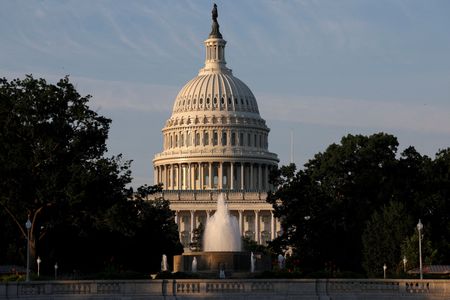By Richard Cowan and David Morgan
WASHINGTON (Reuters) -President Donald Trump was due to meet with congressional leaders on Monday in a last-ditch effort to head off a government shutdown that could disrupt a wide range of services as soon as Wednesday.
It was unclear whether the afternoon White House meeting would yield an agreement to extend government funding beyond a Tuesday midnight (0400 GMT Wednesday) deadline. Democrats say any agreement to extend government funding must also preserve expiring health benefits. Trump's Republicans insist health and government funding must be dealt with as separate issues.
Senate Republican Leader John Thune said his chamber will vote again Tuesday on a stopgap funding bill that the House of Representatives passed on September 19, which the Senate rejected. That bill, which would fund the government through November 21, does not address the health care issue.
"It's up to the Democrats," the South Dakota Republican told reporters. He needs at least seven Democratic votes to pass funding legislation.
If Congress does not act, thousands of federal government workers could be furloughed, from NASA to the national parks, and a wide range of services would be disrupted. Federal courts might have to close and grants for small businesses could be delayed.
Budget standoffs have become relatively routine in Washington over the past 15 years and are often resolved at the last minute. But Trump's willingness to override or ignore spending laws passed by Congress has injected a new dimension of uncertainty.
Trump has refused to spend billions of dollars approved by Congress and is threatening to extend his purge of the federal workforce if Congress allows the government to shut down. Only a handful of agencies have so far published plans detailing how they would proceed in the event of a shutdown.
At issue is $1.7 trillion in "discretionary" spending that funds agency operations, which amounts to roughly one-quarter of the government's total $7 trillion budget. Much of the remainder goes to health and retirement programs and interest payments on the growing $37.5 trillion debt.
CHRONIC SHUTDOWNS
There have been 14 partial government shutdowns since 1981, most lasting just a few days. The most recent was also the longest, lasting 35 days in 2018 and 2019 due to a dispute over immigration during Trump's first term.
This time healthcare is at issue. Roughly 24 million Americans who get coverage through the Affordable Care Act will see their costs rise if Congress does not extend temporary tax breaks that are due to expire at the end of this year.
House Democratic Leader Hakeem Jeffries said Congress needs to make those tax breaks permanent right now, because higher health insurance premiums are being finalized and the new signup period starts November 1.
"We believe that simply accepting the Republican plan to continue to assault and gut health care is unacceptable," Jeffries said at a Monday press conference.
Thune said Congress must first ensure funding does not lapse before it tackles other problems.
“Major decisions should not be made in haste," he wrote in a Washington Post opinion piece on Monday. "They certainly shouldn't be made because one party is threatening to shut down the government if it doesn't get its way."
Some Democratic aides have suggested their party could back a short-term funding bill if Republicans agreed to hold a vote on health care benefits. But Jeffries dismissed that idea last week, saying Republicans cannot be trusted.
Democrats want to energize their voting base ahead of the 2026 midterm elections, when control of Congress will be at stake, and have broadly lined up behind the healthcare push.
But Democratic aides have privately expressed concerns that a shutdown could create a public backlash if Democrats do not effectively argue their case and instead come off sounding as just being opposed to whatever Trump wants - a stance Republicans like Thune have derided as "Trump Derangement Syndrome."
(Reporting by Richard Cowan; additional reporting by David Morgan, Katharine Jackson and James Oliphant; writing by Andy Sullivan; Editing by Scott Malone, Alistair Bell and David Gregorio)







